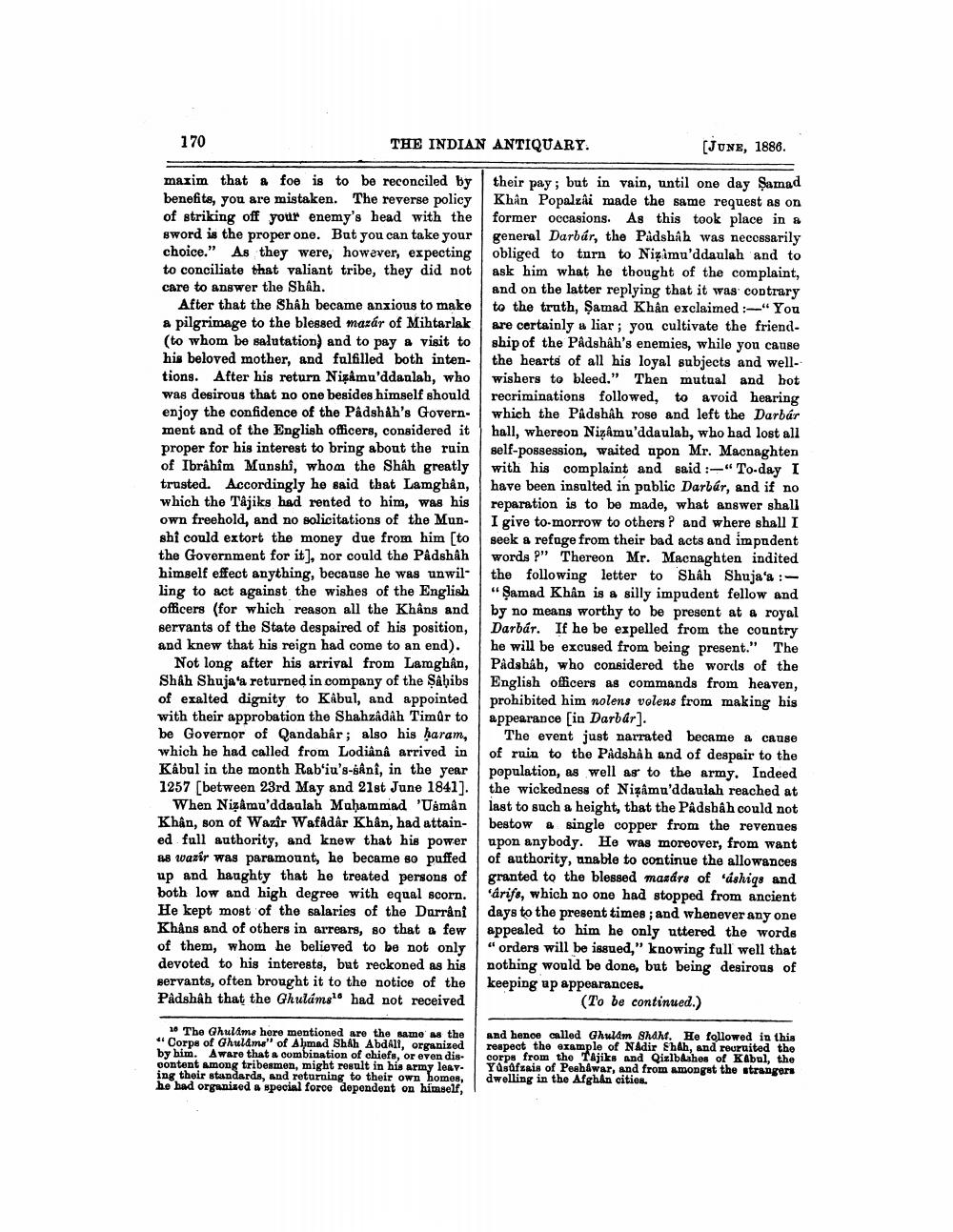________________
170
THE INDIAN ANTIQUARY.
(JUNE, 1886.
maxim that a foe is to be reconciled by their pay; but in vain, until one day Şamad benefits, you are mistaken. The reverse policy Khân Popalzai made the same request as on of striking off your enemy's bead with the former occasions. As this took place in & sword is the proper one. But you can take your general Darbár, the Padshah was necessarily choice." As they were, however, expecting obliged to turn to Nizamu'ddaulah and to to conciliate that valiant tribe, they did not ask him what he thought of the complaint, care to answer the Shah.
and on the latter replying that it was contrary After that the Shah became anxious to make to the truth, Şamad Khân exclaimed :-"You a pilgrimage to the blessed mazár of Mihtarlak are certainly a liar; you cultivate the friend(to whom be salutation and to pay a visit to ship of the Padshah's enemies, while you cause his beloved mother, and fulfilled both inten- the hearts of all his loyal subjects and welltions. After his return Nizâmu'ddaulah, who wishers to bleed." Then mutual and hot was desirous that no one besides himself should recriminations followed, to avoid hearing enjoy the confidence of the Padshah's Govern. which the Padshah rose and left the Darbár ment and of the English officers, considered it hall, whereon Nizâmu'ddaulah, who had lost all proper for his interest to bring about the ruin self-possession, waited upon Mr. Macnaghten of Ibrahim Munshi, whom the Shih greatly with his complaint and said :-"To-day I trusted. Accordingly he said that Lamghân, have been insulted in pablic Darbár, and if no which the Tajiks had rented to him, was his reparation is to be made, what answer shall own freehold, and no solicitations of the Mun. I give tomorrow to others ? and where shall I shi could extort the money due from him to seek a refage from their bad acts and impudent the Government for it), nor could the Padshah words P" Thereon Mr. Macnaghten indited himself effect anything, because he was unwil the following letter to Shah Shuja'a :ling to act against the wishes of the English "Şamad Khân is a silly impudent fellow and officers (for which reason all the Khâns and by no means worthy to be present at a royal servants of the State despaired of his position, Darbár. If he be expelled from the country and knew that his reign had come to an end). he will be excused from being present." The
Not long after his arrival from Lamghan, Pådshah, who considered the words of the Shah Shuja'a returned in company of the Sahibs English officers as commands from heaven, of exalted dignity to Kabul, and appointed prohibited him nolens volens from making his with their approbation the Shahzâdâh Timûr to appearance [in Darbar]. be Governor of Qandahár; also his haram, The event just narrated became a cause which he had called from Lodiânâ arrived in of ruin to the Padshah and of despair to the Kábul in the month Rab'iu's-sêni, in the year population, as well as to the army. Indeed 1257 [between 23rd May and 21st June 1841). the wickedness of Nigamu'ddaulah reached at
When Nizamuddaulah Muhammad 'Usman last to such a height, that the Padsbah could not Khân, son of Wazîr Wafadar Khân, had attain- bestow a single copper from the revenues ed full authority, and knew that his power | upon anybody. He was moreover, from want 88 wazir was paramount, he became so puffed of authority, unable to continue the allowances up and haughty that he treated persons of granted to the blessed masdrs of 'shiqs and both low and high degree with equal scorn. 'árife, which no one had stopped from ancient He kept most of the salaries of the Darrant days to the present times; and whenever any one Khans and of others in arrears, so that a few appealed to him he only uttered the words of them, whom he believed to be not only "orders will be issued," knowing full well that devoted to his interests, but reckoned as his nothing would be done, but being desirous of servants, often brought it to the notice of the keeping up appearances. Padshah that the Ghulamsas had not received
(To be continued.)
10 The Ghulam here mentioned are the same as the "Corps of Ghuldma of Ahmad Shah AbdAll, organized by him. Aware that a combination of chiefs, or even dis. oontent among tribesmen, might result in his army leay. ing their standards, and returning to their own homes, he had organized a special force dependent on himself,
and hence called Ghulam Shahi. He followed in this respect the example of Nadir Shah, and recruited the corps from the Tajiks and QizlbAshes of Kabul, the Yusufzais of Peshawar, and from amongst the strangers dwelling in the Afghan cities.




